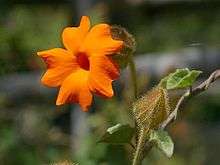Thunbergia gregorii
| Thunbergia gregorii | |
|---|---|
 | |
| Scientific classification | |
| Kingdom: | Plantae |
| (unranked): | Angiosperms |
| (unranked): | Eudicots |
| (unranked): | Asterids |
| Order: | Lamiales |
| Family: | Acanthaceae |
| Genus: | Thunbergia |
| Species: | T. gregorii |
| Binomial name | |
| Thunbergia gregorii S.Moore, 1894 | |
Thunbergia gregorii, commonly known as orange clockvine or orange trumpet vine, is a herbaceous perennial climbing plant species in the family Acanthaceae, native to East Africa and sometimes cultivated as an ornamental vine. The bright, pure all-orange flowers distinguish it from the related black-eyed Susan (Thunbergia alata).[1]
Spencer Le Marchant Moore described the species in 1894, naming it after John Walter Gregory.[1] Within the genus Thunbergia, it is most closely related to T. alata, the two being placed in the subgenus Parahexacentris.[2] The common name of clockvine relates to the vine spiralling upwards in a clockwise direction.[1]
Thunbergia gregorii is an evergreen vine that grows to 8-10 ft. tall, or if left without support can become an extensive groundcover.
It is native to east Africa.[2]
Thunbergia gregorii is pollinated by bees.[2]
Hardy to -1 C, Thunbergia gregorii flowers more profusely and even year-round in warmer climates, while restrcited to summer and autumn in cooler climates.[3]
Propagation is by cuttings taken in the summer.[1]
References
- 1 2 3 4 Armitage, Allan M. (2011). Armitage's Vines and Climbers: A Gardener's Guide to the Best Vertical Plants. Timber Press. p. 193. ISBN 9781604692891.
- 1 2 3 Schönenberger, Jürg (1999). "Floral structure, development and diversity in Thunbergia (Acanthaceae)". Botanical Journal of the Linnean Society. 130 (1): 1-36 [10-11]. doi:10.1111/j.1095-8339.1999.tb00779.x.
- ↑ Mathias, Mildred E. (1985). Flowering Plants in the Landscape. University of California Press. p. 126. ISBN 9780520054141.
External links
- "Thunbergia gregorii", East African Plants: A Photo Guide, retrieved 27 March 2015
| Wikimedia Commons has media related to Thunbergia gregorii. |